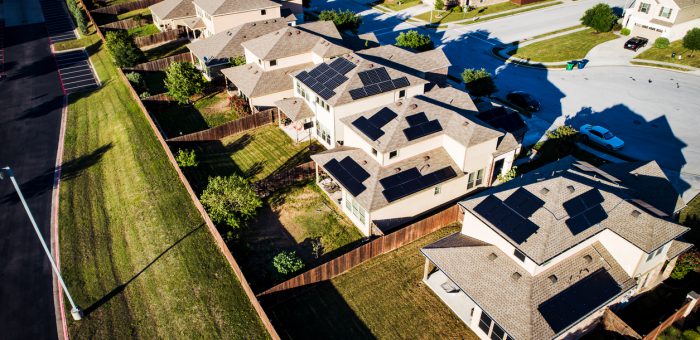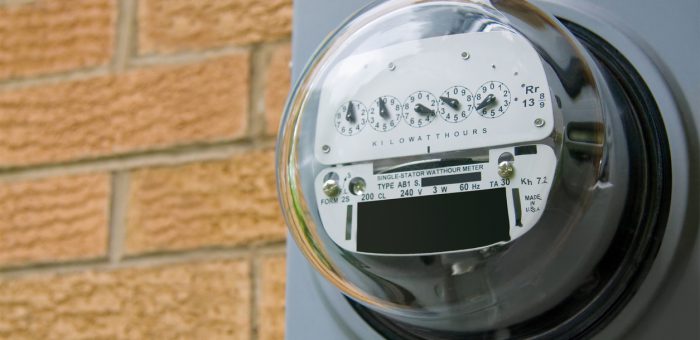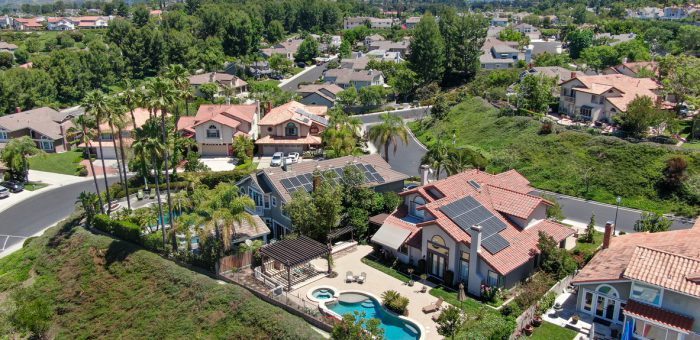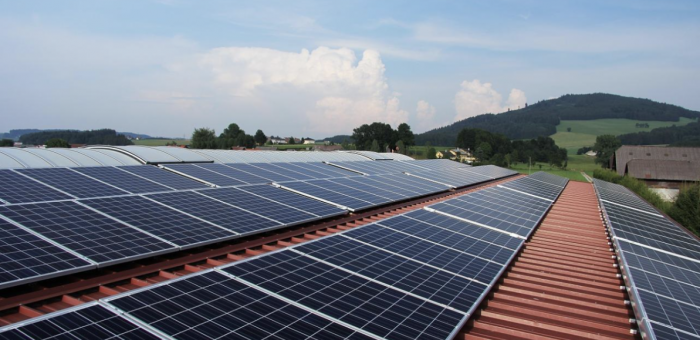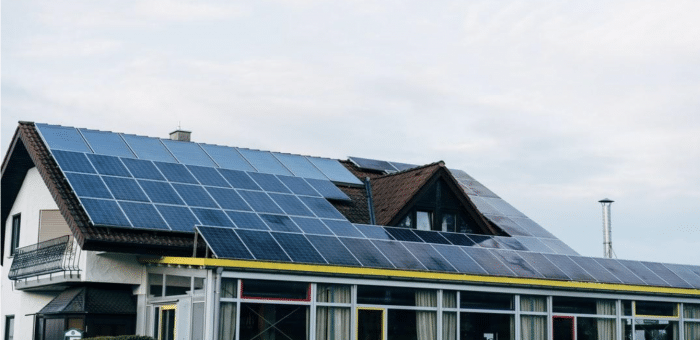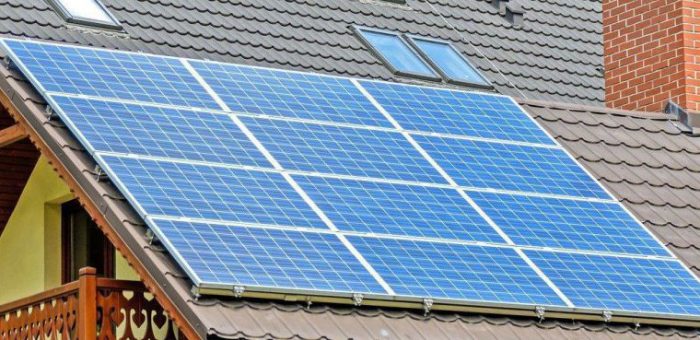With energy markets facing extreme volatility for the past few years, many Americans are struggling with high electricity bills and looking for ways to reduce costs. Adding rooftop solar panels to your home might be a great option to help reduce your electricity bills, contribute to a more sustainable energy future, and allow you to become more independent from market volatility.
[solarcta]
Table of Contents
Do I Have the Right Type of Home for Solar Panels?
How Long Will I Live in This Home?
How Will I Pay for Solar Panels?
What Environmental Impact Can I Make by Choosing Solar?
Ready to See if Rooftop Solar Is Right for You?
Investing into rooftop solar can provide long-term cost savings, however it is important to talk to an expert about your electricity usage and determine the right amount of rooftop solar panels to ensure the highest return on your investment.
Specifically, before buying a home solar system, ask yourself the following questions:
Do I Have the Right Type of Home for Solar Panels?
You don’t have to live in the hot and sunny climate you’d think to add home solar panels, but certain details about your home can make rooftop solar more viable.
Consider factors such as your:
Roof type
Solar panels don’t necessarily have to go on your roof, but that tends to be one of the most efficient and effective locations. So, you’ll want to see if you have a roof type that’s easily compatible with most solar panels, e.g., asphalt shingles. Some materials, like wood, can be tricky to install panels on. A quick online search and perhaps a call with a solar provider can likely help you figure out where you stand.
Roof size
Depending on how much energy you’d like to generate, you can see if your roof is large enough to accommodate enough solar panels. Keep in mind, though, that different panels can produce different energy amounts, so that could affect your needs.
For example, if you buy 325-watt per hour solar panels, which is roughly in the middle of the pack in terms of solar panel power output, then you’d need 23 of these solar panels to generate enough energy usage for the average home, as CNET calculates.
As you calculate your current energy needs and speak with a solar installer about available solar panel options, you can get a better sense of what works based on your roof size.
Roof age
The newer your roof, the more it usually makes sense to install solar panels. But if your roof is getting up there in age, that could make the economics trickier, as you might incur re-installation costs from having to take off the solar panels and then put them back on the new roof.
In general, if your roof is 10+ years old, consider setting up an inspection to see if your roof is a good candidate for solar panels in its current state, as Owens Corning notes. Or, let a solar installer take a look.
Roof direction
Generally, south-facing roofs are the best candidates for solar panels in the Northern Hemisphere, based on the natural path of the sun. However, west-facing roofs can also be good candidates, particularly if you use a lot of energy toward the end of the day, as a New York Times article examines.
That doesn’t mean you can’t put solar panels on a north- or east-facing roof, but they might not produce as much power as some other roofs would.
Sunshine/shading/temperature
If you live in a generally warm-weather, sunny place like California, Florida, or Texas, your home is likely a good candidate for rooftop solar. Ideally, the outdoor temperature in your region would be between 59°F and 95°F, as a This Old House article notes.
Fun fact: Texas ranks as the fourth sunniest state in the U.S. and California coming in at fifth, finds Stacker. Arizona ranks first.
But that doesn’t mean you can’t use solar panels in places with harsh winters. If you live in Colorado (sixth sunniest state) or New York (43rd sunniest), for example, you can likely still add solar panels, especially if your particular home gets a healthy amount of sunlight, such as by having minimal shading.
For optimal performance, you generally want at least four hours of direct sunlight per day. But solar panels still work—albeit less efficiently—during cloudy, rainy or snowy days.
If your roof receives a lot of shade from nearby trees or other homes/buildings, though, that could make it tough to get your money’s worth, unless you’re willing to do some cutting. But that could create its own challenges, like making your home warmer, so you may want to speak with an expert first.
HOA rules
If you live in a house that’s part of a homeowners association (HOA) or similar organization, you might think that you can’t add solar panels. However, states such as California and Texas have protections in place that limit what HOAs can restrict when it comes to solar energy installations.
You’ll still need to consider particular rules in your area, but know that you might have more leeway than you’d otherwise assume.
[solarcta]
How Long Will I Live in This Home?
Even if your home checks all the boxes in terms of having desirable conditions for adding rooftop solar, you should still consider how long you’ll likely live there.
Given the investment of time and money when adding a rooftop solar system, you probably want to live in that home for several years to get a good ROI. The good news, though, is that homes with solar energy systems sell for 4% more than equivalent non-solar homes, finds 2019 Zillow research. So, in case you do decide to move, your home could have a unique selling point and fetch a higher price.
If you do stay put and want to recoup your investment, the exact time frame depends on factors like how much energy you typically use and any tax credits you may be eligible for, as these can affect the payback period. Here too, a solar expert can help you calculate how long it will take for your solar array to start saving you money, i.e., when lower energy bills outweigh the cost of the system.
How Much Energy Do I Use?
Another integral consideration is weighing how much energy you use and the cost of that energy, compared with how much solar power you can add and what switching to solar would mean for your utility bills.
A good place to start is checking your electricity usage, which you can likely view via past bills. Keep in mind, though, that if you add solar panels to generate electricity for your home, you might be more inclined to electrify more appliances. For example, you might replace a gas stove with an electric one if you plan a system that can generate enough power for these types of appliances.
So, if you want to make these types of conversions, then you could also weigh potential energy savings by reducing gas consumption and replacing that with renewable solar power.
You might even find that your home is capable of generating more solar power than you consume.
In that case, you could potentially send excess energy back to the grid and receive credits to reduce your utility bills (you might still pay a little, such as from using grid power at night when you’ve exhausted solar power) via a process called net metering if your utility offers these services. Don’t worry, it’s typically easier than it sounds.
The magic of Power Wizard is that we’ll find you the best electricity provider to maximize net metering savings, while also helping you plan your perfect rooftop solar array.
How Will I Pay for Solar Panels?
Rooftop solar systems vary drastically by household and state, so you’ll want to prepare for how to pay for them.
If you have the means to pay in full, that can save you money on interest payments, but not everyone has the luxury to spend that cash up front. Others choose to finance their solar investments, which essentially works like any other loan, such as for your car.
When working with Power Wizard, our solar advisors will help you find financing options that meet your needs.
The good news is that if you own your solar system anywhere in the U.S., whether you pay in full or finance it, you can receive incentives, such as the federal solar tax credit. This tax credit essentially reduces the cost of solar systems by 30% if installed by 2032.
Adding solar panels can also make you eligible for state or local tax incentives and rebates, such as through your utility provider. For example, Austin Energy customers can get a $2,500 rebate by completing an online solar education course and installing an eligible system.
Another example is how you can get a property tax exemption in Texas based on the value solar panels add to your home. As mentioned, going solar can boost your home price, but depending on where you live, you might be able to avoid paying extra property taxes on that added value.
California has implemented multiple incentives including the Self Generation Incentive Program (SGIP), net metering to receive credits for the electricity generated, Property Assessed Clean Energy Program (PACE) to name a few.
Ask your solar advisor for more information on tax benefits and rebates available in your area.
[solarcta]
What Environmental Impact Can I Make by Choosing Solar?
Lastly, consider the environmental impact you can make by adding a rooftop solar system. While your primary motivations might be financial, being able to reduce greenhouse gas emissions, for instance, can be an added bonus for homeowners.
You can use calculators, such as those from the International Renewable Energy Agency and the Environmental Protection Agency to get a better sense of the environmental impact of switching to solar based on your homes energy usage.
In addition to reducing greenhouse gas emissions, solar power can provide additional environmental benefits, such as improving air quality by reducing the reliance on more pollution-heavy fuel sources.
Ready to See if Rooftop Solar Is Right for You?
Asking yourself these five questions can help you figure out if rooftop solar makes sense for your circumstances.
But to make the best decision, you’ll also want to know what a solar system would cost you, while also finding a solar installation company that you trust. Don’t automatically choose the lowest-cost provider, as they might not provide a high-quality installation that maximizes solar panel efficiency, or they might have a more limited warranty, for instance.
Compare reviews and consider working with a guide like Power Wizard that has vetted partners to help you get the most out of your solar installation.
Get a free solar quote and learn how a custom rooftop system can benefit your home.
[solarcta]
More From the Power Wizard Blog
-
Do Solar Panels Increase Home Value?
The United States now has more than 6,000 people who work in the solar power industry and help us enjoy the benefits of this amazing technology. As solar panels become more and more common, some people are wondering, “Do solar panels increase home value estimates?” The truth is that solar panels can provide a long list of […]
View Article -
What Is Net Metering and How Does It Work?
A staggering 1300% increase. That’s how much the number of electric customers engaging in net metering skyrocketed from 2010 to 2020. But what is behind this surge? What exactly is net metering, and how could it potentially change the way you view your electricity consumption? The journey from an ordinary consumer to a potentially profitable one […]
View Article -
The Top Sources of Carbon Emissions in the U.S.
Climate change due to rising global temperature seriously threatens the natural ecosystem. It can result in erratic weather featuring intense drought, heat waves, melting ice caps, warming oceans, and increased storms when left unchecked. As the impact of climate change worsens, the risk of biodiversity loss and human extinction gets bigger. Table of Contents What […]
View Article -
California Solar Tax Credit & Incentives for Residential Rooftop Solar
Are you considering investing in residential solar panels in California? You’re not the only one. Research shows that California was ranked number one out of 50 states in 2022 for solar power generation, with more than 11 million homes powered by the sun. A major reason why solar power is popular statewide is that prices have dropped […]
View Article -
How to clean your solar panels
Click on a section to skip directly to it: Why is it important to clean your solar panels?Solar panel cleaning: a step-by-step breakdownMake sure you’re saving the most on your monthly energy bill Have you considered installing a renewable energy source at your home? Power Wizard recommends trying solar energy, which accounts for 3% of […]
View Article -
Solar Energy Credits: Everything You Need to Know
Solar panels are a great way to save money. They are energy efficient and reduce the impact of electricity production on the environment. You can get them installed on the roof of your house to reduce your reliance on the electric grid. Once installed, solar panels help passively produce energy from the sunlight — as […]
View Article -
Incentive-Based Energy Plans: What Are Your Options?
Incentive-based energy plans are becoming critically important as war, sanctions, and declining fossil fuel production cause nonrenewable energy prices to skyrocket. Fortunately, private companies are busy developing energy-efficient technologies while all levels of government are offering substantial financial incentives for consumers to adopt renewable energy sources. Let’s examine the many federal, Texas, and local energy […]
View Article -
How Long Do Solar Panels Last?
Owning a home is expensive, and that’s not expected to change anytime soon. On top of everything else, the cost of energy can be a burden for many familiar and even more so when temperatures reach extreme highs and lows. Whether you’re well-off or living paycheck to paycheck, you’re probably interested in lowering your energy […]
View Article
